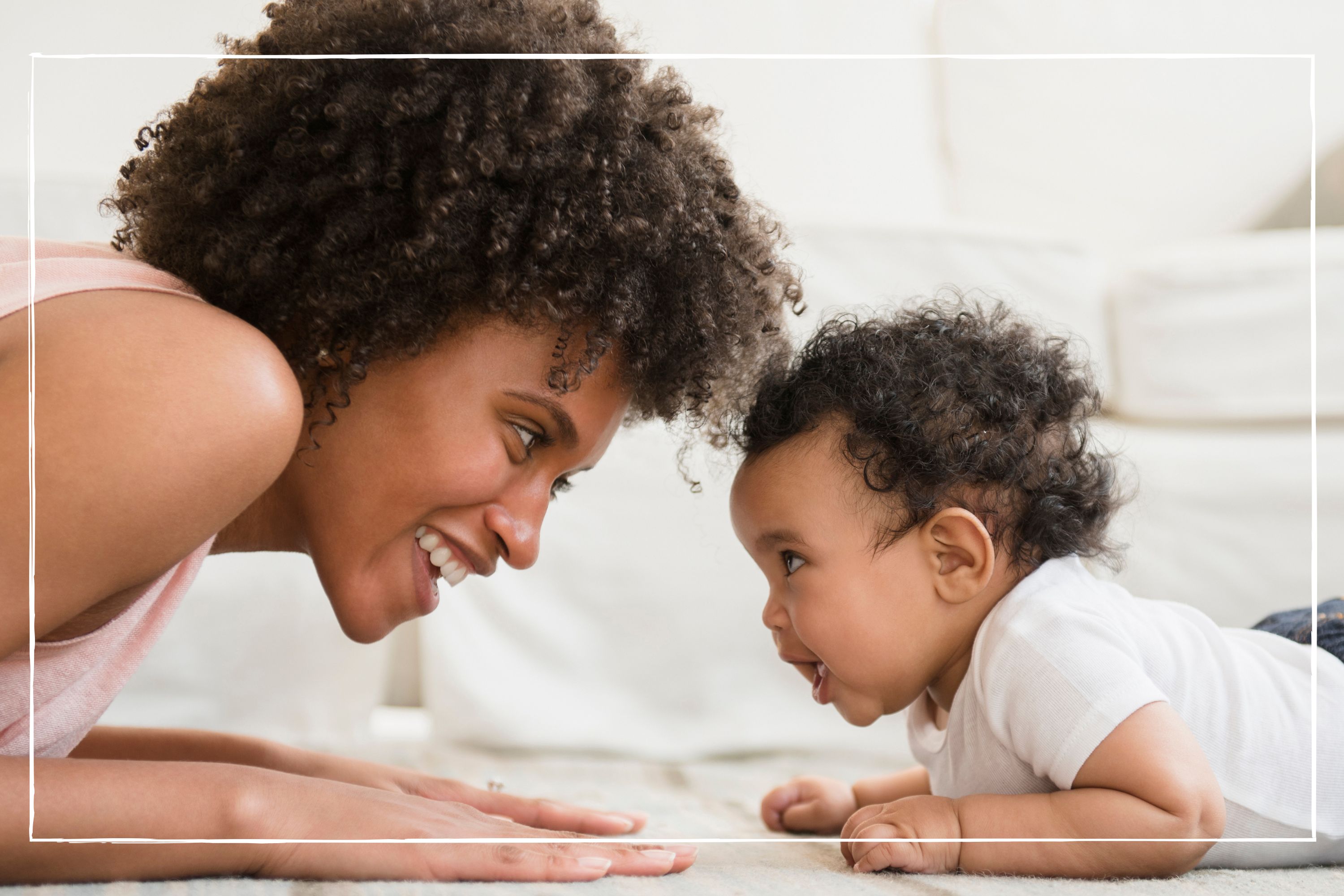When do babies smile? And how to encourage your baby to smile
“When do babies smile?” is an important question for many parents. Find out when you can expect to experience that special moment.

Kirsty Ketley

“When do babies smile?” is a common question for many parents. While newborns are extremely cute, it has to be said that those early few weeks of not getting much back from them can sometimes be difficult
This is why their first smile is one of the big baby development milestones we all look forward to. But figuring out when a baby is actually smiling can sometimes be tricky. Also child development stages are different for all, so it may feel frustrating if your friend’s little one is beaming at everyone, but you haven’t had the slightest hint of a smile. But trust us when we say it won’t be long before you see that first special grin, and before you know it their baby teeth will be through and it will be toothy grins all round.
Qualified early years expert, Kirsty Ketley says: “Babies generally start smiling around two months old, and anything before this is likely to be wind."
When do babies smile?
Babies generally start to smile socially at the age of two months. You may notice what looks like a smile earlier than this. However this is more likely to be a ‘reflux smile’. But if you’re feeling frustrated waiting for that first glimpse of a smile, don’t worry. It will be worth the wait!
Sarah, mum of four-month-old Finley, says: “I can still remember the first time Finley smiled at me. It felt as though we had been waiting for it for so long and when it finally came it was amazing!” Smiling is one of the first ways your little one learns to communicate with you. So social smiling, as it is known, is very important. Studies have shown that babies learn to use smiling as a form of communication from a very young age.
According to the NHS by around two months old your baby should be starting to smile. Studies have shown that social smiling generally happens around this time, although this is often later for babies who were born prematurely.
Early years consultant and trainer, Alison Featherbe says: “Babies are born ready to communicate, they love to be with other babies and grown-ups. They look at faces and move their bodies to show that they like to be with others. “Babies look at faces and copy movements that adults make with their face, like sticking out their tongue and opening and closing their mouth. If you watch closely you’ll also see their eyes grow bigger. Smiling with their eyes, body and mouth shows that they like adults talking to them.”
Parenting advice, hot topics, best buys and family finance tips delivered straight to your inbox.
How to encourage your baby to smile
- Make eye contact when you are talking to your baby
- Smile at your little one often
- Talk to your baby when you notice them trying to interact with you
- Sing to them
The best way to encourage your baby to smile is to interact with them as much as possible. This can include talking and singing to them, as well as making eye contact and, of course, smiling at them yourself. Babies learn pretty quickly how to start communicating with their parents and smiling is one of the first ways they do this.
Jenny, who has a six-month-old daughter, Sky, says: "Sky always seemed quite a serious baby and it was funny when we were smiling and smiling at her and she was just staring back at us. Then all of a sudden one day she just broke into the biggest grin. Now she's the smiliest baby ever and people always comment on it."
When studying the topic of when babies smile, researchers found a strong association between mothers' behaviour and their babies' smiles. So the best way to encourage your baby to smile is to spend lots of time with them.
Kirsty, who is also the co-founder of Parenthood App, says: “Smiling at your baby is a great way to encourage them to smile, as they will try copying your facial expressions. Make sure you are close enough for them to see your face, about 30cm apart, so when you are having cuddles is a good time. Plus, when they are lying in the cot or on a play mat is also a nice opportunity.”
Alison adds: “Making relationships drives us all. Babies copy the movements adults make with their faces. Try opening and closing your mouth, opening and shutting your eyes, and using lots of facial expressions that convey different types of emotion. Say “I can see that you're smiling”, to acknowledge a smile and communicate that you have ‘heard’ your child, not through their voice but through their actions of smiling or laughing.”
However, don’t forget that babies are also developing their ability to regulate their emotions and may look away if they are feeling too overstimulated. This study found that babies use gaze aversion to lower their heart rate. Don’t take it personally if this happens. Just give them a break and try again later.
Kirsty suggests: “It is best at a time when they are calm and alert, not when they are tired, hungry or there is lots going on around them. Singing or talking to them softly will also help as your baby loves the sound of your voice.”
Frequently asked questions
Can babies smile at 4 weeks?
Wondering when do babies smile is a hot topic among new parents they also wonder can babies smile at 4 weeks? This may be because our sleep-deprived brains are desperate for some recognition from our little ones! However, although some babies appear to smile this early, it is more likely to be wind or what is known as a ‘reflex smile’.
According to doctors this smile is similar to the jerky arm and leg movements your baby's body experiences as it goes through the equipment-testing process. So you may see the corners of your baby's mouth turn up in their sleep or after a feed. While these moments feel very special, as they give a glimpse of what is to come, they are not considered to be a social smile.
Soon enough, though, your little one will flash their first real smile, on purpose.
Kim, mum to six-month-old, Matilda, says: “In the early weeks we kept thinking we’d seen her first smile, but then when she did a real smile one day we could totally tell the difference. I must admit I squealed with happiness!”
Kirsty explains: “The earliest you may see a smile would be at about 6 weeks week old. But usually their first social smile, the term for a proper 'happy' smile, is about 8 weeks plus.
What is the earliest age a baby can smile?
The earliest age a baby can smile is around 6 weeks. However, most won’t start to smile properly until around 8 weeks. It can be hard in the first few weeks when you feel like you’re giving and giving and getting nothing back. But by the time your baby is three months old you should be seeing regular smiles.
If your little one hasn’t smiled yet, don’t worry. Try talking to your baby more often, making eye contact, blowing raspberries and smiling throughout the day.
It’s important to remember that all babies develop at their own speed. So try not to feel too disheartened if your baby hasn’t started smiling yet. However, if you are concerned about any of their development, then speak to your health visitor or GP.
Do babies smile or is it wind?
When babies first start smiling it can sometimes be hard to distinguish between a smile or wind and it’s not unusual to whip out your phone to take a photo, only to realise your little one is actually filling their nappy! Plus, babies also have a reflex smile which is a result of them testing out their body.
Alison explains: “Babies do smile, and you’ll know the difference between a facial expression due to wind or one that is the beginnings of a meaningful relationship. Reciprocate their smiles and they will get to know the feelings associated with smiling.”
So how do you tell the difference between a reflex and a real smile? It’s all about the timing and duration. As a rule, a reflex smile tends to be shorter and occurs randomly, when the baby is sleeping or tired. But a real smile, on the other hand, occurs in response to something, like seeing your face or hearing a familiar voice.
What is a ‘social smile’ and what does it mean?
A social smile is when babies start smiling in response to something. This may be smiling in response to seeing you or hearing your voice. Smiling is one of the first communication skills babies develop. Studies have even shown that babies smile to make their mothers smile.
The more your child starts to smile and get a response back, the more they are likely to do it. So don’t be surprised if your little one suddenly starts grinning at everyone while you’re doing the supermarket shop!
Alison says: Babies laugh and gurgle, telling you what they like. They begin to vocalise, looking at you to gain attention and tell you that they want you to be with them. This is the start of their personal, social and emotional development.
“They like to see grown-up faces when feeling upset, worried, tired or hungry, to reassure them with a calming look and a warm smile. As they grow older they will begin to laugh at something amusing or engaging.”
What does it mean when a baby smiles at you?
Babies use smiles as a form of communication. Once a baby has learnt how to do a social smile they will use it to show that they are happy. This may be when they see you or when you talk or sing to them.
Do newborns smile because they’re happy?
Newborn smiles are usually what is known as reflex smiles, as they begin to test out what their body can do. However from around 8 weeks babies will begin to have social smiles, which are because they are happy.
Do newborns know their mum?
Newborn babies can recognise their mums in a number of different ways, from the sound of her voice to her smell. This study even found that two day old babies recognised the smell of their mothers armpits. Newborn babies have quite fuzzy eyesight to begin with, which is why it is important to get close to them when you are smiling at them.
Related articles:
Child development stages: Ages 0-16
Child development stages: Ages 1-5
Video of the Week:

Kirsty is a qualified early years practitioner and parenting consultant with a wealth of knowledge and experience from over 22 years of working with families and children from birth to the teenage years. Kirsty's career has seen her work in a variety of roles, from children's holiday rep and nursery nurse to over 16 years working as a daily nanny. Originally setting up her business as an ad-hoc nanny service, providing flexible childcare to other parents in the local area (and finding a way to keep working as a mum herself) Kirsty now uses her vast experience as a professional, along with her personal experience of being a mum, to give consultations in all areas of parenting and she regularly writes and contributes in the press as a 'go to' parenting expert. Originally from the Midlands, Kirsty now lives in Surrey with her husband Stuart and their two children, Ella, 9 and Leo, 5.

Emily-Ann Elliott is an experienced online and print journalist, with a focus on health, travel, and parenting. After beginning her career as a health journalist at The Basingstoke Gazette, she worked at a number of regional newspapers before moving to BBC News online. She later worked as a journalist for Comic Relief, covering stories about health and international development, as well as The Independent, The i, The Guardian, and The Telegraph. Following the birth of her son with neonatal meningitis, Emily-Ann has a particular interest in neonatal health and parental support. Emily-Ann has a degree in English literature from the University of Newcastle and has NCTJ and NCE qualifications in newspaper journalism.
- Kirsty KetleyParenting Expert